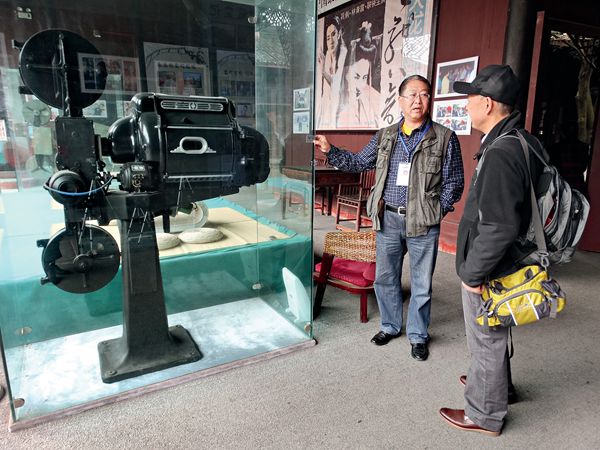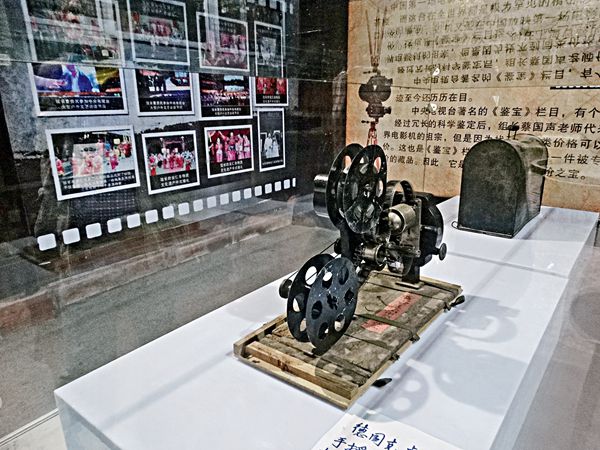A museum, a dream
- By staff reporter Liu Dongping
 0 Comment(s)
0 Comment(s) Print
Print E-mail China Today, February 15, 2017
E-mail China Today, February 15, 2017
Anren Town in Dayi County, Sichuan Province has been nicknamed “China’s museum town” as it houses many museums that display Chinese history and culture. One of them is a museum of old movie-related items. Its owner is Cao Guimin, a passionate collector.
|
A stationary movie projector produced soon after the founding of the People’s Republic of China collected by Cao Guimin. |
Anren is also the hometown of Liu Wencai (1887-1949), a famous landlord during the Republic of China period (1912-1949). The old movie museum just happens to occupy the mansion of Liu Yuanxuan, a prominent figure in Liu’s clan.
It feels as if you are going back in time upon entering this museum. It has on display over 20,000 posters of old movies from before the 1980s, more than 3,000 copies of old movies made before the 1970s, 3,000-odd comics of pre-1980s movies and old film magazines, six old projectors made before the 1970s, and countless tickets and bills of fare, as well as old film stereo sets. Cao has devoted over 20 years to establishing this museum and its comprehensive collection.
Unique Collections
Divided into different exhibition zones, the museum has a nostalgic atmosphere, evoked with posters pasted on the wall of classic old movies such as Five Heroes on Langya Mountain and old film melodies playing which almost every Chinese knows – such as Why the Flowers Are So Red. There are also posters of iconic Chinese film stars such as Zhou Xuan (1918-1957) and Zhang Ruifang (1918-2012).
Many “firsts” in China’s film history feature among Cao’s collection, such as the first movie ticket released by a cinema on the Nanchang Road in Shanghai in the early 1900s; the first book on film and cinema – How to Make a Movie – published in 1921; and the first administrative regulations on the operation of theaters published in 1930. Other precious items include a filmstrip of a battlefield in Europe during World War II and the book Hollywood – A Film Empire published in 1946.
|
The film projector produced by the German company Friedrich Krupp AG collected by Cao is the oldest projector extant in China. |
Cao has another rare piece in his collection – a specimen of a banknote bearing the image of Hong Yong-hee, a North Korean actress who starred in The Flower Girl in 1972. It marked the first time in the world that the image of an actress had been printed on a banknote. Cao’s full collection of items related to The Flower Girl, including the script, tape, posters, postcards and the banknote, also drew the interest of Kim Jong-il, late leader of North Korea who was also an avid collector of movie items. He especially asked his cultural counsellor to make contact with Cao.
The cultural counsellor visited Cao’s museum and took a look at his exhibits about North Korean movies. When leaving, the cultural counsellor asked Cao if he could sell the banknote with the image of Hong Yong-hee to Kim Jong-il as the leader liked it very much. Cao replied that he would have gladly given one to Kim if he had two, but he couldn’t because he only had one.
Later the cultural counsellor invited Cao to be the executive producer of a film jointly made by China and North Korea. In September 2009, Cao was invited to participate in the “China and DPRK Film Week” activity during the celebration of the 60th anniversary of the establishment of diplomatic ties between the two countries. During the event, Cao invited the actress Hong Yong-hee to sign her name on a poster of The Flower Girl that he had collected.
Another item in which Cao takes great pride is a film projector produced by the German company Friedrich Krupp AG. On the projector are Chinese characters showing that it passed through customs on June 8, 1896, in Shanghai.
According to Cao, the projector first played a movie in Shanghai on August 11, 1896. In 1904, the projector was transported from Shanghai to Beijing to show a movie during the celebration of the 70th birthday of Empress Dowager Cixi (1835-1908). However, it suffered a malfunction and burned out. Today we can still see that black spot on it.








Go to Forum >>0 Comment(s)